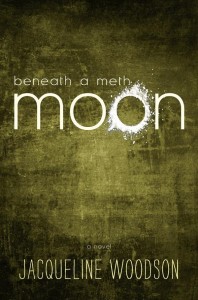When we think of refugees, we think of people driven from their homes in developing nations due to war or oppression. Rarely do we think of people fleeing the effects of global climate change as refugees, nor do we consider our own nation’s citizens in that category. In a moving poem titled “On Refuge and Language” and published in the essay and poetry anthology What Lies Beneath: Katrina, Race, and the State of the Nation (South End Press, 2007), Palestinian-American poet Suheir Hammad writes:
I do not wish
To place words in living mouths
Or bury the dead dishonorably
I am not deaf to cries escaping shelters
That citizens are not refugees
Refugees are not Americans
I will not use language
One way or another
To accommodate my comfort
I will not look away
All I know is this
No peoples ever choose to claim status of dispossessed
No peoples want pity above compassion
No enslaved peoples ever called themselves slaves (167)
 In acclaimed author Jacqueline Woodson’s 2012 novel Beneath a Meth Moon (Penguin), Laurel, her father, and her baby brother fled their Pass Christian, Mississippi home before the storm, but Laurel’s grandmother, M’lady, refused to leave, and Laurel’s mother refused to abandon her ailing mother. Mother and grandmother perished inside a wrecked Wal-Mart. The three survivors spent two years with relatives in Jackson, but a combination of a crowded house and job opportunities further north drove them to the Midwestern town of Galilee.
In acclaimed author Jacqueline Woodson’s 2012 novel Beneath a Meth Moon (Penguin), Laurel, her father, and her baby brother fled their Pass Christian, Mississippi home before the storm, but Laurel’s grandmother, M’lady, refused to leave, and Laurel’s mother refused to abandon her ailing mother. Mother and grandmother perished inside a wrecked Wal-Mart. The three survivors spent two years with relatives in Jackson, but a combination of a crowded house and job opportunities further north drove them to the Midwestern town of Galilee.
Galilee is cold, flat, and landlocked, and Laurel, now 15, longs for her beachside home and her family to be made whole. She knows that both are gone forever, and the overwhelming sense of loss drives her to T-Boom, a basketball player with the tattoo of a bowl of gumbo on his arm—a symbol of his Louisiana-born grandmother. Yet, T-Boom is a meth user and small-time manufacturer, and when he introduces Laurel to the drug, it takes away her longing and makes her feel powerful for the first time in four years.
Woodson’s spare, poetic novel follows Laurel through the devastation of meth addiction to the point where she ends up begging on the street in winter and people give her money in the hope that she will overdose and go away forever. Her path crosses that of Moses, a gay African-American muralist hired by families to memorialize the town’s young people already claimed by the drug.
Woodson calls her novel “an elegy,” and her white protagonist reflects through her grief and emptiness the loss felt by all refugees who want their homes back and their families alive and together. Moses shares that loss, as his mother died of a drug overdose and he is on the verge of leaving Galilee for college, having never fit in anywhere since his mother’s death. Despite the degradation of Laurel’s circumstances, Woodson accords her character a fundamental dignity and respect. Laurel once had people to love and a place in the world. Readers understand her choices at the same time as they hope she will escape her addiction and find something to hold onto in her new life in a cold, flat, landlocked town.
This could have been a sensationalistic novel—a cautionary tale against the dangers of meth. Instead, it is a thoughtful and, above all, compassionate one. For as Hammad concludes:
Yes Amadou this my country
And these my people
Evacuated as if criminal
Rescued by neighbors
Shot by soldiers
Adamant they belong
The rest of the world can now see
What I have seen
Do not look away
The rest of the world lives here too
In America (168-169)
2 comments for “Longing for Place: Katrina “Refugees” and Beneath a Meth Moon”